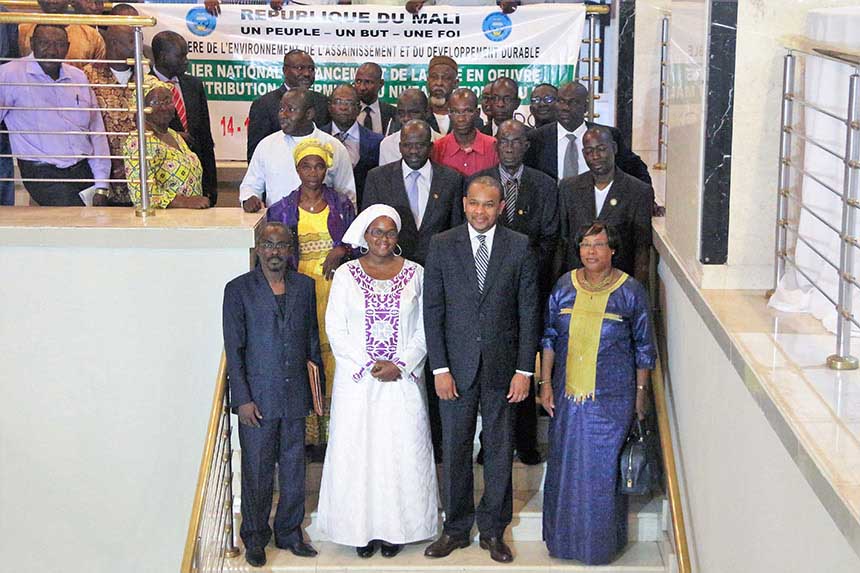Climate and Development Action Unite in Mali

Workshop Participants in Bamako
By Yamide Dagnet and Nathan Mesnildrey
Landlocked in West Africa, Mali experiences a predominantly warm desert and savanna climate, and the country’s heavy reliance on agriculture makes it particularly vulnerable to climate change. With an increase in average temperatures of 0.7 degrees Celsius since 1960, Mali has been facing increasingly severe droughts and disrupted rain patterns over the past few decades. These phenomena have worsened and accelerated already existing conditions, such as desertification, especially in the vulnerable North, forcing many Malians to adapt their lifestyles or relocate.
The Intergovernmental Panel on Climate Change (IPCC), predicts a very likely increase in the frequency of severe droughts, extreme temperatures, and epidemics in the coming years. For a country whose national wealth is 33 percent dependent on the agricultural sector, failure to tackle such impacts will have enormous consequences on economic growth and sustainable development. The pressing effects of climate change, coupled with stresses on Malian society and low levels of economic development, calls for more holistic approaches and integrated solutions, supported by more engagement from sectoral ministries and the treasury, and better coordination between them.
Mali has long been tackling and adapting to drastic changes in its environment and to its population. The Malian government started studying its climate to identify solutions, and with the support of international partners, to tackle climate change. In this regard, indigenous knowledge has always been recognized as key for adaptation. In recent years, Mali has been actively involved in climate negotiations, holding the chair of the African Group of Negotiators from January 2016 to December 2017. One of the vice-chairs of the IPCC is also Malian. Mali became one of the first countries to participate in the NDC Partnership when it was launched in November 2016, officially joining in September 2017, and remains actively involved.
On 14-16 August, the NDC Partnership supported Mali’s first national consultation on the implementation of its Nationally Determined Contribution (NDC) under the Paris Agreement. Hosted in Bamako by the Ministry of Environment, Sanitation, and Sustainable Development, and its Environmental and Sustainable Development Agency (AEDD), the three-day consultation saw representatives from various ministries, government agencies, parliamentarians, civil society organizations, research and academia, private sector, local authorities, and international partners discuss the inclusion of NDCs in national planning and ways to generate financing amid current domestic challenges. Both the Minister of Environment, Sanitation, and Sustainable Development and the Minister of Economy and Finance opened the consultation to reiterate their determination to work hand-in-hand to confront climate change.
The NDC Partnership is now looking to translate Mali’s political will into concrete action, making use of the Partnership’s global network, and fully support the Malian government in its efforts to integrate the country’s climate commitments into its national development plan. To this end, the NDC Partnership will strive to support existing initiatives and committees, such as the recently established Monitoring and Evaluation Committee on NDC Implementation, to mobilize national and international stakeholders.
Over the three days of the consultation, participants attended working groups to better identify risks and needs, as well as opportunities for different sectors. The sessions furthered exchanges between various stakeholders attending the consultation and resulted in a set of priorities. Three recurring needs arose during the sessions: strengthening institutions and mobilizing finance; assistance for technical implementation; and improved measurement, collection, storage, dissemination, and management of data. Now the Partnership's Support Unit will work with member institutions in Mali, including Germany’s Agency for International Cooperation (GIZ), the United Nations Development Program (UNDP), the World Bank, the African Development Bank (AfDB), and various embassies, to integrate and address these crucial challenges. This cooperation will be formalized in an NDC Partnership Joint Work Plan, which is currently under development. The work plan will serve both the Malian government and implementing partners in coordinating their activities to better target priority areas. The work plan will be reflected in Mali’s NDC investment plan.
The consultation also allowed representatives from the Moroccan National Climate Change Institute (4C Maroc) and the Ghana Environmental Protection Agency to share their experiences with their Malian counterparts. Fostering South-South cooperation, the participants showcased lessons learned in building multi-actor involvement in the implementation of climate change programs.
In the coming months, in the run-up to COP23, the NDC Partnership Support Unit and several member countries and institutions will provide support to the Malian authorities in developing a global investment plan; in strengthening its institutional framework as well as its monitoring, reporting, and verification (MRV) system; and in mainstreaming climate and NDC implementation into development planning. Stay tuned for more updates.
References:
